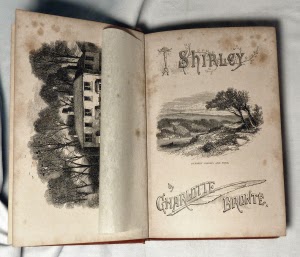The strongest criticism has been - it has too many themes that go nowhere, no real story and no real focus. There is..
*History - Yorkshire in 1811/12 at the time of the Luddite riots . The Napoleonic War had left England deeply in debt, taxes were high and unemployment caused by wartime trade restrictions and embargoes, and the increasing use of labour-saving machinery in the textile mills left the working class artisans struggling to survive and unable to see any way out except through violence and disorder.
* Social history - a portrait of Yorkshire habits and manners with many of the characters based on people Charlotte knew well. Curates and clergymen, mill owners and maiden spinsters, a governess and a tutor - the middle class 'haves' but what is lacking , and what would have tied in with the Luddite theme, is being taken into the life of the 'have-nots' - a working class family. That is kept at a distance and only in one brief passage is there a glimpse of of their misery.
"On his entrance his wife served out, in orderly sort, such dinner as she had to give him and the bairns. It was only porridge, and too little of that. Some of the children asked for more when they had done their portion - an application which disturbed William much."* The Role of Women - particularly that of unmarried women, a future that even at 18 Caroline Helstone is already confronting..
" I have to live, perhaps till seventy years. As far as I know, I have good health, half a century of existence may lie before me. How am I to occupy it? What am I to do to fill the interval of time which spreads between me and the grave?"It's a subject that Charlotte was passionate about and she takes every opportunity to climb on her soapbox and pour forth her feelings; to the extent she puts words into the mouths of her characters that you can't imagine them ever saying.
* Personal Relationships - Robert Moore is a mill owner struggling to stay afloat. His cousin Caroline Helstone is in love with him but although he is attracted to her he knows he needs to marry money and sets his sights on the wealthy Shirley Keeldar but this lively young woman has her own ideas about marriage and is drawn to Louis, Robert's brother and her former tutor.
The growing friendship between shy Caroline and the spirited Shirley makes for delightful reading. Neither of them fit into the local society, their different personalities perfectly complement each other and both have something to give to and to learn from the other.
In the last part of the book the social issues fade into the background and the personal stories become the focus. If Charlotte was intent on happy ever after for everyone who can blame her considering her own circumstances.
She began writing Shirley in 1848 but laid down her pen when her brother, Branwell, died in September. Three months later Emily died and early in 1849 it became obvious that she would soon lose Anne as well. It was after Anne's death a few months later that she resumed writing Shirley, pouring out her grief in the chapter The Valley of the Shadow of Death. It is impossible to imagine such loss and the depths of pain and despair she must have felt.
I am not a critical reader so none of the criticisms bothered me one whit. I may be in a minority but I loved Shirley, loved all the different themes, the stunning descriptions of the landscape, the history and the people of Yorkshire. A real pleasure to read and a wonderful beginning to my journey through the English counties.
Related post - Shirley Country: A Visual Tour
Reading England 2015 - Yorkshire
Back to the Classics 2015 - person's name in the title.


Great review and thanks for all the background. I've marked your post for when I read it.
ReplyDeleteI've often loved books that other people hate and vice versa. I think I'd like Shirley too, in spite of what the critics say!
I think you would too.......and I hope you will! :-)
DeleteI really love this book - planning on re-reading it this year. There's a very short bit set quite near where I live, which makes me love it more! And I very much enjoyed reading about Caroline and Shirley's friendship, Shirley is such a good character :)
ReplyDeleteI'm glad I'm not the only one! And I'm so envious of those of you who live so near all these wonderful places I read about.
DeleteThis is the only Bronte novel I still haven't read and your post has made me think I shouldn't delay any longer! I'm not a particularly critical reader either, so I'm hoping I'll love it as much as you did.
ReplyDeleteI hope you will. Helen.
DeleteSo glad to hear this as Shirley is one of my Reading England books for this year too :-)
ReplyDeleteObviously not everyone likes it but I hope you will.
DeleteI have never heard of this book but now I am completely intrigued. I might have to track it down for The Classics Club myself.
ReplyDeleteJust don't expect Jane Eyre :-)
DeleteOn my second read the clunkiness jumped out at me more, but I still was drawn in by the characters and setting. I'm glad you loved it!
ReplyDeleteI'm rereading Jane Eyre now and am noticing the differences between the two.
DeleteI've had Shirley on my TBR list for awhile. Your review intrigues me and makes me want to read it sooner rather than later!
ReplyDelete